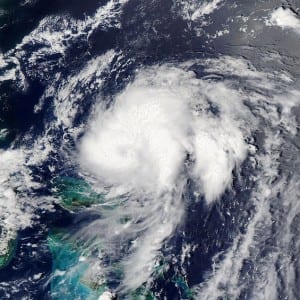 BOSTON, July 18, 2011- According to catastrophe modeling firm AIR Worldwide, the second named storm of the 2011 Atlantic hurricane season, Tropical Storm Bret, formed off the coast of South Florida yesterday evening and is expected to strengthen to just below hurricane strength as it starts its turn toward the northeast.
BOSTON, July 18, 2011- According to catastrophe modeling firm AIR Worldwide, the second named storm of the 2011 Atlantic hurricane season, Tropical Storm Bret, formed off the coast of South Florida yesterday evening and is expected to strengthen to just below hurricane strength as it starts its turn toward the northeast.
As of the National Hurricane Center’s 11:00 am EDT update today, Bret’s center is located about 60 miles north of the Great Abaco Island in the Bahamas. The storm is moving slowly north-northeast at 7 miles per hour with 50 mph maximum sustained winds. A tropical storm warning has already been issued in the Grand Bahama Island and the Abaco Islands in the Northwest Bahamas.
“On its current projected path, Bret is forecast to take a more northeastward turn over the next couple of days, and then eventually take a more eastward turn into the open waters of the Atlantic,” said Dr. Tim Doggett, principal scientist, AIR Worldwide. The NHC’s cone of uncertainty (representing 60-70% confidence in the forecast track) extends to within 20 miles of Bermuda, but the storm is expected to pass north of that island. Bret does not present a risk to the U.S.
“The primary threat from Bret to the Bahamas is rainfall, which will be exacerbated by the slow forward speed of the storm,” continued Dr. Doggett. “Up to four inches of precipitation may accumulate in Grand Bahama and the Abaco Islands.”
According to AIR, residential construction in the Bahamas is largely masonry, while commercial properties are a mix of reinforced concrete and masonry. Both construction types should fare well against Bret’s wind speeds.
Dr. Doggett commented, “At present, it is not expected that Bret will develop into a hurricane, as the dry air to the northwest of the storm has prevented any significant strengthening of the system. Over the next few days, Bret will eventually encounter increased wind shear before weakening over colder waters.”
AIR will continue to monitor this storm and will make additional information available if warranted by events.
Article Provided by AIR Worldwide
